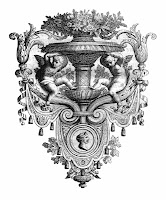Old
People’s Home
All are limitory, but each has her own
nuance of
damage. The elite can dress and decent
themselves,
are ambulant with a single stick, adroit
to read a
book all through, or play the slow movements of
easy sonatas. (Yet, perhaps their very
carnal
freedom is their spirit’s bane: intelligent
of what has happened and why, they are
obnoxious
to a glum
beyond tears.) Then come those on
wheels, the average
majority, who endure T.V. and, led by
lenient
therapists, do community-singing, then
the loners, muttering in Limbo, and last
the
terminally incompetent, as improvident,
unspeakable, impeccable as the plants
they
parody. (Plants may sweat profusely but never
sully themselves.) One tie, though, unites them: all
appeared
when the world, though much was awry there, was more
spacious, more comely to look at, it’s Old
Ones
with an
audience and secular station. Then a
child,
in dismay with Mamma, could refuge with
Gran
to be
revalued and told a story. As of now,
we all know what to expect, but their
generation
is the
first to fade like this, not at home but assigned
to a numbered frequent ward, stowed out of
conscience
as
unpopular luggage.
As I ride the subway
to spend half-an-hour with one, I revisage
who she was
in the pomp and sumpture of her hey-day,
when week-end visits were a presumptive
joy,
not a good
work. Am I cold to wish for a speedy
painless dormition, pray, as I know she
prays,
that God or
Nature will abrupt her earthly function?
Asilo de ancianos
Todos poseen un límite: cada uno
tiene un matiz de daño muy distinto. La élite
es capaz de arreglarse por sí misma,
caminar apoyada en un bastón,
leer completo un libro, interpretar
movimientos de fáciles sonatas.
(Pero acaso la libertad carnal
es el veneno del espíritu:
conscientes de lo que ha sucedido y el porqué
abominan su tristeza sin lágrimas.)
Luego vienen los de silla de ruedas, el promedio
que soporta la tele
y guiado por amables
terapeutas
canta en comunidad.
Después los
solitarios que musitan
palabras en el limbo,
y al final
los que ya son del
todo incompetentes
y como una parodia de
las plantas
(ellas pueden sudar
sin ensuciarse).
No obstante, hay algo
que los une:
todos aparecieron
cuando el mundo,
a pesar de sus males,
era más habitable y
más vistoso
y los viejos tenían
auditorio
y un lugar en la
tierra.
(El niño reprendido
por su madre
podía refugiarse con la abuela para ser consolado
y escuchar algún
cuento.)
Hoy ya todos sabemos
qué esperar,
mas su generación es
la primera
que se ha desvanecido
de este modo:
no en casa sino
asignada a un pabellón, arrojada
como se arrumban
fardos indeseables.
Mientras voy en el
Metro para estar
media hora con una
del asilo,
recuerdo quién fue
ella en su esplendor.
Entonces visitarla
era un orgullo
y no una caridad.
¿Seré tan frío como
para esperar
un somnífero rápido,
indoloro;
o bien para rogar,
como ella ruega,
que Dios o la
naturaleza precipiten
su función terrenal?
Musée des Beaux
Arts
About suffering they were never wrong,
The old Masters: how well they understood
Its human position: how it takes place
While someone else is eating or opening a
window or just walking dully along;
How, when the aged are reverently,
passionately waiting
For the miraculous birth, there always must be
Children who did not specially want it to
happen, skating
On a pond at the edge of the wood:
They never forgot
That even the dreadful martyrdom must run its
course
Anyhow in a corner, some untidy spot
Where the dogs go on with their doggy life and
the torturer's horse
Scratches its innocent behind on a tree.
In
Breughel's Icarus, for instance: how everything turns away
Quite leisurely from the disaster; the
ploughman may
Have heard the splash, the forsaken cry,
But for him it was not an important failure;
the sun shone
As it had to on the white legs disappearing
into the green
Water, and the expensive delicate ship that
must have seen
Something amazing, a boy falling out of the
sky,
Had somewhere to get to and sailed calmly on.
Musée des beaux-arts
Acerca del dolor
jamás se equivocaron
los Antiguos
Maestros. Y qué bien entendieron
su función en el
mundo. Cómo llega
mientras alguno cena
o abre la ventana
o nada más camina sin
objeto.
cómo, mientras los
viejos aguardan reverentes
el milagroso
Nacimiento, habrá siempre
niños sin mayor
interés en lo que ocurre,
patinando
en el estanque helado
a la orilla del bosque.
No olvidaron jamás
que el eterno
martirio ha de seguir su curso,
irremediablemente, en
sórdidos rincones,
donde viven los
perros su perra vida
y la yegua del
verdugo se rasca
las inocentes grupas
contra un árbol.
Por ejemplo, en el Ícaro de Brueghel:
con qué serenidad
todo parece lejos del
desastre.
El labrador oyó
seguramente
el rumor de las aguas
y el grito inconsolable.
Pero el fracaso no lo
conmovió:
brillaba el sol como
brilló en el cuerpo blanco
al hundirse en las
aguas verdes.
Y la elegante y
delicada nave
debió haber visto lo
inaudito:
la caída de un niño
que volaba.
Pero el barco tenía
un destino
y siguió navegando en
calma.

